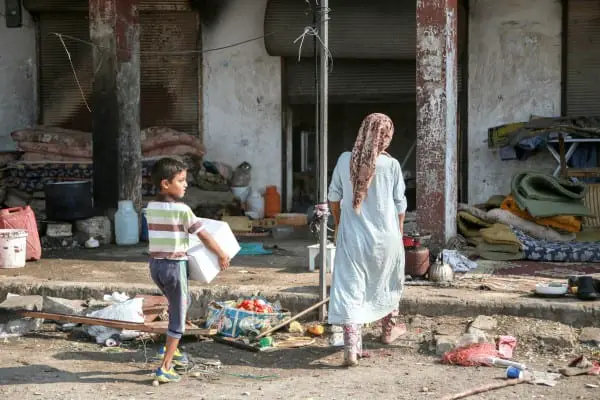This page contains affiliate links. This means if you a follow a link and make a purchase, at no additional cost to you, Humanitarian Careers will receive a commission. Thank you for supporting the site.
Non-governmental organisations (NGOs) are independent organisations that work to help people affected by crises, poverty, and disasters. There are thousands of NGOs around the world – from major international charities to small local community groups.
NGOs do amazing work helping some of the most vulnerable and in need people around the world. However, the NGO sector is also often criticised. But why? If NGOs do such great work, why do some people think they’re bad? Here we’ll go over some of the most commonly cited reasons why NGOs actually have a negative impact…
NGOs Can Be Overly Bureaucratic
A first reason why NGOs are bad is because they are often overly bureaucratic.
A common criticism of the NGO sector is that it’s overly complex and bureaucratic systems reduce the impact of the good work NGOs do. By focusing too heavily on internal processes, and not purely on ensuring high quality aid programmes, NGO’s can use vital resources on areas that do not result in actually helping people.
Although there is a need for NGOs to ensure effective management of their resources, and especially to have robust systems in place regarding financial management, many complain that NGOs focus too much on this and not enough on their frontline programmes.
Many NGOs have many staff who use their time to manage bureaucratic processes. One critique of the NGO sector is that a greater focus of staff and finances on delivering aid, rather than bureaucracy, would improve many NGOs. The potential for NGOs to be overburden by bureaucracy can be one negative aspects of the sector.
NGOs Can Distort Local Markets
A second reason why NGOs can be bad is because they can distort local markets.
When areas are hit by crises, usually many NGOs move in. They fly in huge numbers of international staff and equipment to begin responding to the crisis. However, they also set-up operations by renting offices, guesthouses, and vehicles, as well as hiring large numbers of local people. Although this can provide a significant economic boost to the affected community – which can be beneficial during a disaster, it can actually also cause major market distortions.
Many NGOs do not adequately assess the local economy of where they are operating. This means they can overpay in wages, rentals and to suppliers. This can push up prices across the local economy, making it harder for community members to purchase what they need.
NGOs can massively distort local labour markets. By paying high wages, people are encouraged to leave lower paying, but valuable jobs to work for NGOs. There have been many instances of local doctors quitting hospitals to work as drivers for NGOs – because it pays better. This is a real example of how NGOs can be bad.
NGOs Sometimes Do Not Respond Quick Enough
A third reason why NGOs are bad is because they are often too slow to respond to crises.
When sudden crises hit – such as earthquakes, floods or extreme weather events, NGOs must respond almost immediately in order to save lives and limit the destruction caused by the disaster. However, often NGO’s fail to respond as quickly as needed and this is can be a major negative. Although many NGOs put significant resources into preparing for disasters to help them respond quicker, many do not and this is a major reason against NGOs.
As well as rapid onset crises, there are also crises that develop over a longer time. Famines, conflicts, or refugee crises, often take weeks or months to develop into major disasters. Many NGOs do not see the warning signs of these crises and therefore leave deploying their response until it is too late. This massively limits their ability to help people in need.
The inability of many NGOs to respond to both rapid and slow onset crises is one reason why NGOs can be bad.
They Are Too Dependent On Large Donors
Another negative aspect on many NGOs is that they rely too heavily on a few single donors.
There are many ways that NGOs fund their projects. These include public donations, money given by private businesses and foundations, and grants given by funding bodies. The problem with many NGOs is that they are heavily reliant on funding grants. This can cause many issues and is a definite reason why some NGOs are not as effective as they could be.
In the NGO sector, large donors are often known as ‘institutional funding’. This includes organisations such as the United Nations and European Union, as well as government donors like the UK’s FCDO, Germany’s GFFO or Canada’s GAC. Although organisations such as these do provide significant funds to NGOs, it can also cause many issues…
NGO’s that rely almost entirely on institutional funding, and many do, are beholden to donor organisations. This means they lack independence and essentially must only do the work donors choose to fund. It also means they must regularly apply for new grants, resulting in significant resources being dedicated to securing funding.
NGO’s Fail To Respond To Some Crises
One reason why NGOs are bad is because they often fail to respond to crises.
The mandate of many NGOs is to assist people in need through the provision of neutral and impartial aid. However, although many NGOs uphold this standard, in fact there are crises around the world that either go without a significant humanitarian response or have only a few NGOs working. The fact that NGOs can fail to respond to some crises is a major negative factor against them.
There are several reasons why NGOs may fail to respond to a crisis. A lack of funding is a major barrier to many NGOs working where and how they want. Humanitarian access may also be hindered, with armed groups or government authorities preventing NGOs from helping some communities. However, many NGOs are also more likely to respond to crises that receive significant news coverage and have the public’s attention, meaning more forgotten crises receive less interventions. Long, protracted, and complex crises are also less likely to see NGOs delivering aid.
Although there may be legitimate reasons why some NGOs are unable to respond to a crisis, the fact that people in need can go without assistance is a bad side of the NGO sector.
NGO Online Courses
If you want to know more about NGOs, we highly recommend the online course Introduction to NGO Management. It goes over how NGOs operate and introduces students to the unique aspects of the NGO sector. Follow the link for more information.
Another online course we highly recommend for those wanting to know more about NGOs is How To Design and Fund International Development NGO Projects. Anyone working for an NGO needs a basic understanding of how NGO projects are set-up, and how to input to funding proposals. Click the link to get more information on the course.
If you are looking to work for an NGO, we highly recommend the online course International Humanitarian and Development Careers. We think it provides one of the best overviews of the NGO sector and gives a clear breakdown of the skills needed to get an NGO job. It also provides valuable information on how to successfully apply for positions within NGOs. Click the link to be taken to the course’s page.
There Is Often A Lack Of Coordination Between NGOs
A common complaint against NGOs is that they lack coordination. This is a key reason why NGOs can be bad.
When crises hit, many NGOs deploy to respond and assist people in need. It is vital that NGOs responding to a disaster coordinate between them. A lack of coordination results in duplicated efforts, as well as some areas being underserved. Poor coordination between NGOs can have a massive impact on whether people receive the aid they need.
There are a number of mechanisms in-place to improve coordination between NGOs. However, too often NGOs see themselves in competition with each other, or put raising funds and running their own projects above the need to coordinate effectively. This can result in wasted resources, as well as increasing the cost of an NGOs response whilst decreasing the overall impact NGOs can have during a crisis.
The often lack of effective coordination between NGOs, and the tendency for NGOs to put their own priorities first, is a major reason why NGOs are bad.
There Can Be Corruption In Some NGOs
Many people say NGOs are bad because they can be corrupt.
NGOs operate in areas hit by crises and disasters, where huge numbers of people are often desperate. They also work in areas of extreme poverty. As a result, theft and corruption is rife within the areas NGOs operate. Sadly, NGOs themselves are not immune and often experience corruption within their organisations. The loss of financial or material resources means that NGOs are less able to help people in need, and this can be a major mark against them.
Many NGOs have a large presence in some of the most corrupt countries in the world. Although NGOs have strong mechanisms in place to tackle corruption and actively work to avoid it, it is not possible to completely remove the risk of fraud within NGOs.
As well as corruption, NGOs can be accused of nepotism – using the power and influence their staff have to help relatives, friends or family member. This can be through preferential treatment in hiring, or in issuing business contracts. Like corruption, NGO’s work hard to reduce nepotism, however when they fail to do so it has a serious negative effect on the whole NGO sector.
NGO’s Are Too Reliant On International Staff
A major problem with many NGOs is that they are too reliant on international staff and do not utilise enough local talent, especially in senior roles.
The majority of people who work for large NGOs are from the country where the projects are being ran. NGOs recruit many local people in a wide range of positions. However, too many NGOs rely on international staff to manage projects. It is often felt that this overreliance on expat staff is a major negative of many NGOs.
Local people know how to help their communities the best. Although expat staff can bring a wealth of technical expertise, NGOs need to combine this knowledge with local understanding. The NGO sector has an issue with depending too much of international staff and creating a two-tier hierarchy where local staff work to implement projects overseen by a rotating management team of expats.
Efforts have been made to make NGO work more ‘localised’ – however the NGO sector has failed to truly adopt this. Many cite the lack of localisation in humanitarian responses as a major bad side of NGOs.
NGO Projects Can Lack Sustainability
A final reason why NGOs are bad is because many of their projects lack sustainability.
When NGOs run a project, they provide significant financial support, as well as the required staff and materials. However, NGO’s rarely have a permanent presence in a community. In fact, once a crisis is over, or funding dries up, the majority of NGOs will leave an area. A big reason why NGOs can be bad is because when they leave their projects stop. NGO projects often lack sustainability – as in they cannot run long-term, especially once the NGO exits.
Communities hit by disasters, or living in poverty, require long-term assistance. Even when the initial crisis is over, recovery needs can remain extensive. The local community, civil society or government often lack the resources to a run an NGOs projects once the NGO departs. This means the vast majority of NGO programmes finish as soon as the NGO leaves. This lack of sustainability is a major downside of NGOs.
Although sustainability is becoming a more important focus for many NGOs, still too many NGO projects are short-term and do not have a lasting impact. This is an often-cited reason why NGOs are bad.
If you want to know more about NGOs, explore our page on the top NGO online courses here.





